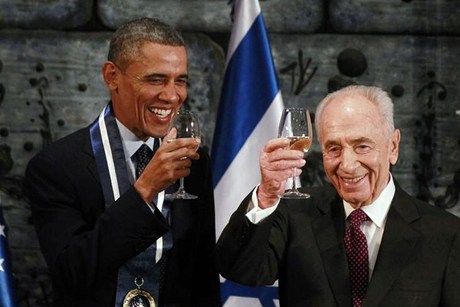![]()
Sun, March 24, 2013 | RubinReports | By Barry Rubin

U.S. President Barack Obama, seen here toasting with Israel’s President Shimon Peres, ended his three-day visit to Israel by paying his respects at the graves of Theodor Herzl, the founder of modern Zionism who died in 1904, and former Israeli Prime Minister Yitzhak Rabin, who was assassinated in 1995. Obama also visited the Yad Vashem Holocaust memorial before touring the Biblical birthplace of Jesus Christ. (Photo: Reuters)
Given the shape of Jewish history, verbal expressions of friendship that others would take as the norm are treated as overwhelming acts of wonderfulness. This tradition goes back to the days of monarchies, when Jews saw themselves as powerless people who were passive recipients of the king’s generosity.
One reason that idea continued was because expressing the idea that Jews might have some power, some ability to shape events, was a major theme of antisemitism. Indeed, claiming that there is an all-powerful Jewish lobby or even of a Jewish-controlled media (which is laughable) remain to this day one of the main earmarks of antisemitic thinking.
What is the purpose of hasbara, that is, the effort to explain Israel’s situation, experiences, perceptions, and goals? It is not to make everyone love Israel or Jews, though that would be nice, but to create conditions so that Jews are not attacked or materially hurt by hostile neighbors and so Israel can have the environment in which it can operate with enough international support to do what it needs to do.
Let’s discuss these themes in the context of President Barack Obama’s visit to Israel.
From an Israeli, though not necessarily from an American, viewpoint it is absurd to be “pro-Obama” or “anti-Obama.” The issue is what Obama does in regard to Israeli interests. This is not necessarily the same criteria that American Jews would take, given their additional involvement and interest in many other issues that have nothing to do with international affairs.
In Israeli terms, for example, Richard Nixon was a good president. So was Harry Truman, Bill Clinton, and Ronald Reagan. Note the wide differences in their domestic policies, reputations, and worldviews in an American context..
If Obama is now going to be considered friendly toward Israel then, to use his own words in a different context, he didn’t build it on his own. Indeed, if Obama had his own way, if he could do anything he wanted to do, he would have been terribly unfriendly, the most unfriendly American president in history. (Jimmy Carter’s hostility came almost completely after leaving office.) And in many ways, that is how he began his presidency.
But Obama is neither a free agent nor a fanatic out to hurt Israel at any price. As president he interacts with reality, at least on this issue. There were three categories of factors that changed the strong hostility of Obama’s original position into something else.
First, internal American factors:
- A tradition seen as the norm of strong support for Israel by the United States;
- Pro-Israel public opinion;
- A largely pro-Israel Congress.
Second, regional factors:
- The lack of cooperation by the Palestinians who gave Obama zero assistance in his attempts to help them. Imagine if the Palestinian Authority had said in 2009:
“We want negotiations right away and peace as fast as possible. But we expect Obama to get us what we demand, including big Israeli concessions in exchange for very little. President Obama, you can have peace if you only bash Israel!”
But they did the opposite, turning down ever Obama initiative.
- Lack of cooperation by the Arab states generally, which did not take advantage of Obama’s offer to help them get major Israeli concessions through U.S. pressure;
- Iran’s intransigence;
- The fact that Islamists proved Obama wrong and became more radical.
In short, Obana discovered that distancing himself from Israel bought no gain.
Third, actions by Israel and American Jews:
- The Israeli government’s strategy of cooperating with Obama as much as possible to avoid giving him a — you can call it a reason or an excuse — for a quarrel;
- The tireless work of American Jews, both supporters and opponents of Obama, to explain the issues and mobilize support. This includes those whose strong criticism stung the administration.
It is not that Obama was nice toward Israel all along; it is that there is a new policy based on his realizing there wasn’t going to be a breakthrough to a comprehensive peace agreement.
There are, however, still two problem areas. First, the president expresses sympathy but not agreement with Israel. His view is:
I understand why you act as you do but you are wrong. You can obtain lasting peace fast if only you aren’t stubborn and suspicious.
This, however, doesn’t matter very much. The second problem is critical. How can you be so nice to a country when you help its enemies? How can you help populate Israel’s borders and neighborhood with those who openly proclaim their goal of committing genocide on its people?
If one asks: Has Obama helped or hurt Israel’s strategic situation the answer is that he has quite definitely hurt it overall. If one asks: Has Obama helped or hurt Israel’s ability to deal with that strategic situation the answer is that he has been about as good — but certainly not better — as several predecessors by merely continuing past U.S. aid and other policies.
Again, though, it is not a matter of liking or disliking Obama as a person but analyzing his behavior as a president.
The day after Obama’s election in 2008, I organized a program in Tel Aviv on the result. I and everyone on the panel spoke of what a great person Obama was and how he was going to be a great friend of Israel. It was proper not to start a conflict with him.
During 2009, however, I was faced with an important question: Should I be flat-out honest as to what I thought regarding Obama’s policies or would that jeopardize the bilateral relationship. Would supporters of Obama react against Israel because of criticism of their beloved chief executive?
I decided to speak up, partly because the dangers were so great and also since the whole point of criticism is to persuade someone to change course. By 2011 it was already becoming clear that U.S.-Israel relations as such were not the problem, U.S. Middle East policy was.
Let me summarize in this way:
- Arab behavior was the main force showing Obama that he was wrong. That parallels what happened during the Cold War when anti-American actions by radical Arab regimes and their alliance with the USSR persuaded previously unfriendly U.S. policymakers that they benefited from an alignment with Israel;
- The fact that the American people recognized the rightness of Israel’s narrative could not be ignored by leaders, especially if bashing Israel brought no strategic advantage;
- What’s significant is not whether or not Obama loves Israel but that he sees support as being in U.S. interests. Reality forced him to move from a policy of distancing himself from Israel to one of embracing Israel;
- But Obama must learn now about the dangers of Islamism or his administration will continue to be a net minus for Israel. It would be better if Obama learned to love the Arabs, Iranians, and Turks fighting for moderation and real democracy in their countries, not the totalitarians in those places;
- By truly protecting U.S. interests, Obama would do more for Israel than by making any number of friendly speeches.
Barry Rubin is director of the Global Research in International Affairs (GLORIA) Center and editor of the Middle East Review of International Affairs (MERIA) Journal. His latest book, “Israel: An Introduction“, has just been published by Yale University Press. Other recent books include “The Israel-Arab Reader” (seventh edition), “The Long War for Freedom: The Arab Struggle for Democracy in the Middle East” (Wiley), and “The Truth About Syria” (Palgrave-Macmillan). The website of the GLORIA Center and of his blog, Rubin Reports. His original articles are published at PJMedia.



 RSS
RSS










Latest Comments
Hello Mike, Thank you for your positive feedback to the article. I felt there wasn’t too much critical analysis of ...
Thanks for this considered and well constructed article. A follow up article on the manner in which the editorial contro...
THE CLUELESSNESS OF CLAIMING THAT OBAMA'S MIDDLE EAST POLICIES WERE A FAILURE CANNOT BE FURTHER FROM THE TRUTH, WHAT THE...
As long as Obama is the president of the usa do not trust the us government......
Thank you for an good read....